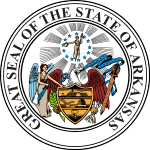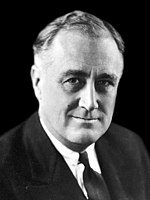| ||||||||||||||||||||||||||
All nine Arkansas votes to the Electoral College | ||||||||||||||||||||||||||
|---|---|---|---|---|---|---|---|---|---|---|---|---|---|---|---|---|---|---|---|---|---|---|---|---|---|---|
| ||||||||||||||||||||||||||
 County Results
| ||||||||||||||||||||||||||
| ||||||||||||||||||||||||||
| Elections in Arkansas |
|---|
 |
The 1936 United States presidential election in Arkansas took place on November 3, 1936, as part of the 1936 United States presidential election. State voters chose nine representatives, or electors, to the Electoral College, who voted for president and vice president.
Incumbent Democratic President Franklin D. Roosevelt of New York (running with Vice President John Nance Garner of Texas) carried Arkansas in a landslide, taking 81.8% of the state's vote to Republican Alf Landon's 17.86%.[2] Even amidst a national Democratic landslide – in which Roosevelt carried every state except Vermont and Maine and earned more than 60% of the national popular vote – Arkansas weighed in as nearly 40% more Democratic than the nation at-large.
This was typical of the time; with the exception of the Unionist Ozark counties of Newton and Searcy where Republicans controlled local government, Arkansas since the end of Reconstruction had been a classic one-party Democratic “Solid South” state.[3] Disfranchisement of effectively all Negroes and most poor whites had meant that outside those two aberrant counties, the Republican Party was completely moribund and Democratic primaries the only competitive elections.
The 1920s did see a minor change in this, as increased voting by poor Ozark whites as a protest against Woodrow Wilson's internationalist foreign policy meant that Warren G. Harding was able to win almost forty percent of the statewide vote in 1920;[4] however despite his national landslide Calvin Coolidge in 1924 could not do any more than win the two traditional Unionist GOP counties. 1928 saw the rest of the Outer South and North Alabama bolt the anti-Prohibition Catholic Al Smith, but the presence of Arkansas Senator Joseph Taylor Robinson as running mate meant that within Arkansas only the most northwesterly counties with ordinarily substantial Republican votes would suffer the same fate.[5]
The following years saw Arkansas plunge into the Great Depression, followed almost immediately by a major drought from the summer of 1930s until the winter of 1931/1932.[6] This came on top of a long depression in agriculture, which was still the dominant player in Arkansas’ economy and was backed up by the “Great Migration” of the state's agricultural labor force to northeastern and midwestern cities.[7] Arkansas gave extremely heavy support to Democrat Franklin Roosevelt in 1932, when he garnered more than 86% of ballots and swept every county in the state,[8] becoming the first Democrat to win Searcy County since before the Civil War and only the second to win adjacent Newton County.[9]
Throughout his first term as president, Roosevelt was extremely popular in the “Solid South”[10] and despite embryonic concerns over loss of Southern control of the national party due to abolition of the “two-thirds” rule[11] and some hostility to FDR's repeal of Prohibition[12] he was overwhelmingly and in many places almost unanimously supported by Arkansas’ limited electorate. Ozark Republican Landon did regain the two Unionist and Prohibitionist Ozark counties, but topped 40% in only two of the remaining seventy-three. Nonetheless, the 1936 results in Arkansas were about 10% less Democratic than that of 1932, despite the nation as a whole shifting somewhat to the left. As of 2020, this remains the last time that a presidential candidate has won more than 80% of the vote in Arkansas.
- ^ "United States Presidential election of 1936 — Encyclopædia Britannica". Retrieved November 23, 2017.
- ^ "1936 Presidential General Election Results — Arkansas".
- ^ See Urwin, Cathy Kunzinger (January 1991). Agenda for Reform: Winthrop Rockefeller as Governor of Arkansas, 1967-71. University of Arkansas Press. p. 32. ISBN 1557282005.
- ^ Phillips, Kevin P. (November 23, 2014). The Emerging Republican Majority. Princeton University Press. pp. 211, 287. ISBN 978-0-691-16324-6.
- ^ Barnes, Kenneth C. (November 2016). Anti-Catholicism in Arkansas: How Politicians, the Press, the Klan, and Religious Leaders Imagined an Enemy, 1910–1960. University of Arkansas Press. pp. 164–165. ISBN 978-1682260166.
- ^ Whayne, Jeannie M.; DeBlack, Thomas A.; Sabo, George; Arnold, Morris S. (June 2013). Arkansas: A Narrative History. University of Arkansas Press. pp. 341–342. ISBN 978-1557289933.
- ^ Whayne, DeBlack, Sabo and Arnold. Arkansas, pp. 313-316
- ^ Grantham, Dewey W. (July 11, 2014). The Life and Death of the Solid South: A Political History. University Press of Kentucky. p. 102. ISBN 978-0813148724.
- ^ Menendez, Albert J. (2005). The Geography of Presidential Elections in the United States, 1868-2004. Jefferson, North Carolina: McFarland & Company. p. 87. ISBN 0786422173.
- ^ Leuchtenburg, William E. (October 2005). The White House Looks South: Franklin D. Roosevelt, Harry S. Truman, Lyndon B. Johnson. LSU Press. p. 51. ISBN 0807151424.
- ^ Frederickson, Kari A. (2001). The Dixiecrat Revolt and the End of the Solid South, 1932-1968. Univ of North Carolina Press. p. 24. ISBN 0807849103.
- ^ Menendez. The Geography of Presidential Elections in the United States, p. 64


